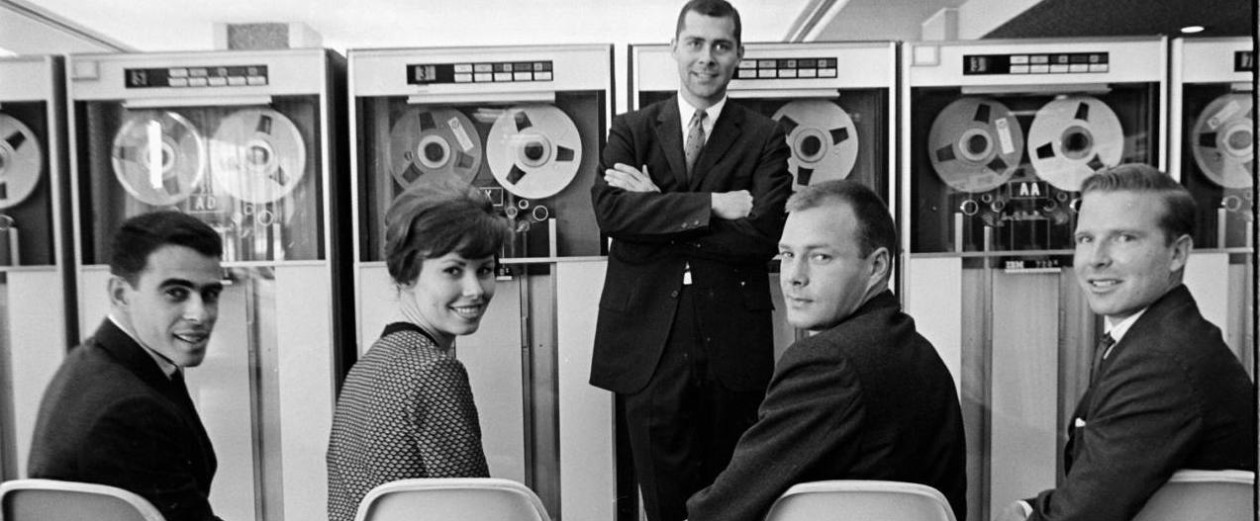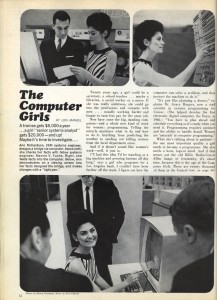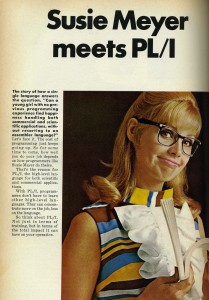A brief excerpt from The Computer Boys Take Over has been published on Womens e-News.
Tag Archives: gender
History of UNIVAC at ArsTechnica
The nerd news website ArsTechnica recently published an article by Mathew Lasar on the history of the UNIVAC I computer. It’s a nice little piece that draws heavily on Kurt Beyer’s excellent recent biography of Grace Hopper and Paul Ceruzzi’s classic History of Modern Computing (one of the earliest of the books published as part of MIT Press’ History of Computing series, of which The Computer Boys Take Over is the latest entry).
Lasar highlights a issue relevant to the history of computer programming that I had previously not encountered (or at least noticed). In discussing the female programmers that Grace Hopper had cultivated at the Eckert Mauchly Computer Company, he notes that after the sale of EMCC to Remington Rand, many of these women left to pursue other opportunities, largely because of the lack of respect they felt in their new big-corporation environment:
“On top of that, new management did not sympathize with EMCC’s female programmers, among them Grace Hopper, who by 1952 had written the UNIVAC’s first software compiler. ‘There were not the same opportunities for women in larger corporations like Remington Rand,’ she later reflected. ‘They were older companies, and the jobs had been stereotyped.'”
During the labor crisis in programming that emerged in the 1950s, these women had plenty of other opportunities, Lasar argues, and many departed for other, more enlightened employers. Read the whole article. A nice piece, and it is good to see this history get rediscovered for a contemporary audience (particularly in a venue as popular as ArsTechnica).
The Computer Girls?
In a recent talk that I gave at Stanford University, I discussed the changing role of women in the computing industry. The focus of the talk was a 1967 article in Cosmopolitan Magazine called “The Computer Girls”. An unusual source for a historian of computing, but one of my favorite and most useful. My particular favorite: a quote from the celebrated computer pioneer Admiral Grace Hopper comparing computer programming to following a recipe: “You have to plan ahead and schedule everything so it’s ready when you need it. Programming requires patience and the ability to handle detail. Women are ‘naturals’ at computer programming.”
[Update: I published a chapter that discusses this material. See “Making Programming Masculine.”1Ensmenger, Nathan. 2010. “Making Programming Masculine.” In Gender Codes: Why Women Are Leaving Computing. . Also, for a discussion of the ways in which my research on the Cosmo Girls has acquired a life of its own, see the post WHO STOLE THE COMPUTER GIRLS?
- 1Ensmenger, Nathan. 2010. “Making Programming Masculine.” In Gender Codes: Why Women Are Leaving Computing.
Top Secret Rosies
The history of women in computing is a story that is only just beginning to be told. There are certain women, like Grace Hopper, who are (deservingly) well-covered in the history, but many of the women who made important contributions are still unknown.
A recent documentary, Top Secret Rosies, by LeAnn Erickson, is currently touring the country. The film tells the story of the female computers who worked on computational projects during the second world war. As of the historical consultants and “talking heads” on the film, I can recommend it highly. There seems to be a burst of coverage on the film everywhere from CNN to Slashdot.
Top Secret Rosies Trailer from LeAnn Erickson on Vimeo.
The politics of programming languages
In Chapter 2 (“Tower of Babel”) I discuss the ways in which different programming languages (FORTRAN, COBOL, and ALGOL, among others) embodied different social, organizational, and professional agendas. Some of this was a reflection of particular problem domains — FORTRAN was obviously designed for scientific applications, and COBOL for business use. But more significantly, many languages were intended to discipline what was seen as a unreliable and recalcitrant labor force. As Fred Gruenberger of the RAND Corporation noted in a 1962 Symposium on Programming Languages, “You know, I’ve never seen a hot dog language come out yet in the last 14 years — beginning with Mrs. Hopper’s A-0 compiler … that didn’t have tied to it the claim in its brochure that this one will eliminate all programmers. The last one we got was just three days ago from General Electric (making the same claim for the G-WIZ compiler) that this one will eliminate programmers. Managers can now do their own programming; engineers can do their own programming, etc. As always, the claim seems to be made that programmers are not needed anymore.”
The notion that programming languages are “artifacts with politics” is a provocative one, and I explore the idea more in my chapter on the Cambrian explosion of programming languages. What follows is an excerpt discussing the gendered nature of many of the advertisements for programming languages that appeared in this period:
In its “Meet Susie Meyers” advertisements for its PL/1 programming language, the IBM Corporation asked its users an obviously rhetorical question: “Can a young girl with no previous programming experience find happiness handling both commercial and scientific applications, without resorting to an assembler language?” The answer, of course, was an enthusiastic “yes!” Although the advertisement promised a “brighter future for your programmers,'”(who would be free to “concentrate more on the job, less on the language”) it also implied a low-cost solution to the labor crisis in software. The subtext of appeals like this was non-too-subtle: If pretty little Susie Meyers, with her spunky miniskirt and utter lack of programming experience, could develop software effectively in PL/1, so could just about anyone.
The actual advertisement was a two-page, full-color extravaganza.

 Follow
Follow

